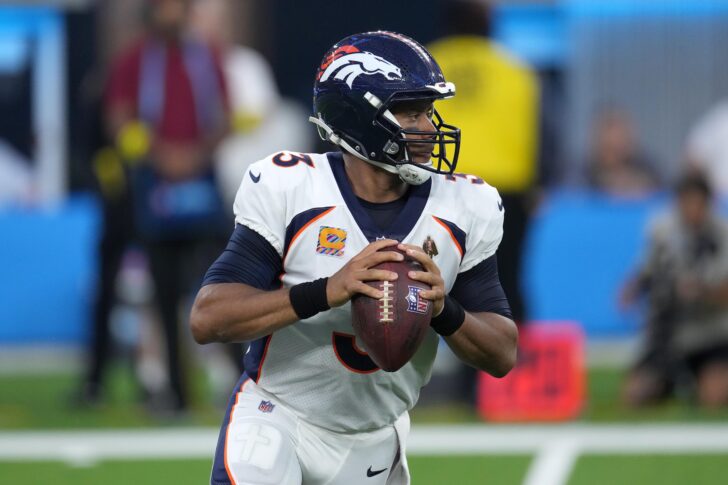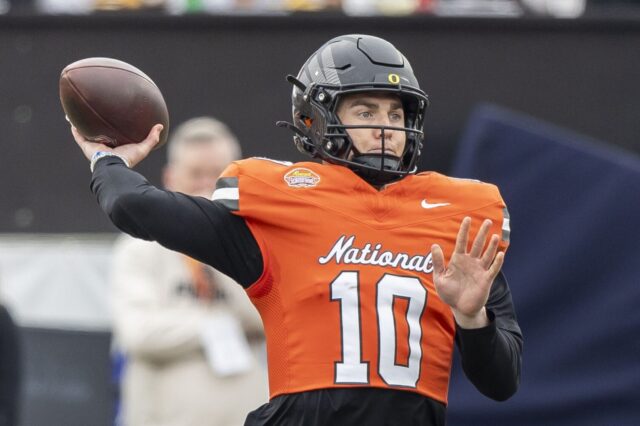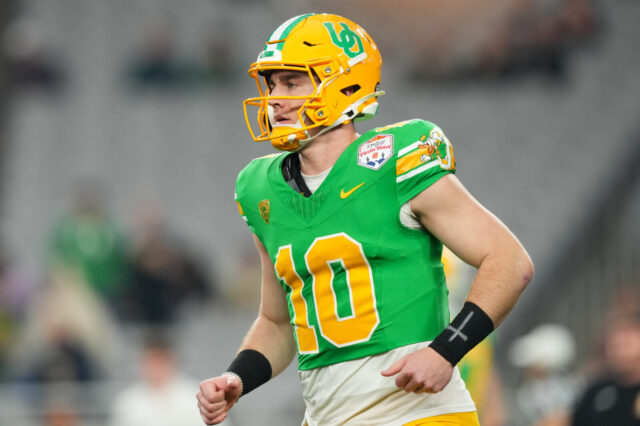The Denver Broncos dropped to 2-4 on the season after a 19-16 overtime loss to the Los Angeles Chargers on Monday Night Football. After a decent start, the Broncos offense fizzled out and struggled in the second half, encountering issues in protection, penalties, and missed opportunities.
Denver Broncos offense standing in their own way
The Denver Broncos defense started off Monday’s primetime matchup against the Los Angeles Chargers offense led by Justin Herbert. Starting opposite Patrick Surtain was rookie cornerback Damarri Mathis. On the first play of the game, Herbert targeted Josh Palmer down the left sideline with Mathis in coverage, but some early contact led to a pass interference call that moved Los Angeles 30 yards downfield.
The Broncos’ defense buckled down, however, forcing Herbert and the offense to punt possession away to Russell Wilson and the Denver offense. The offense saw right guard Quinn Meinerz return to the starting lineup. Earlier in the week, Broncos head coach Nathaniel Hackett emphasized the offense’s need to be more efficient on 1st and 10. That would not be the case after Lloyd Cushenberry was called for holding, backing Denver up to 1st and 20.
Several plays later, another penalty on right tackle Cam Fleming backed the Broncos up to 3rd and 14. Wilson looked to connect with his top target Courtland Sutton who was covered by Chargers cornerback J.C. Jackson. Jackson’s contact was deemed as pass interference, moving the chains for Denver’s offense.
Wilson soon after found tight end, Eric Tomlinson, for a 16-yard reception on a back shoulder throw, getting the offense in rhythm past midfield. After an inside run by Melvin Gordon and a quick pass attempt, Wilson was sacked off the left side by Khalil Mack who bull rushed Calvin Anderson who filled in for Garett Bolles who suffered a season-ending leg injury last week. The Broncos were forced to settle for a 51-yard field goal by Brandon McManus to give them a 3-0 early advantage.
Despite settling for a field goal, Denver’s offense utilized the quick passing game which allowed them to move downfield on their first offensive series.
On the Chargers second offensive series, Jonathon Cooper made his presence felt for Denver defensively, pressuring Herbert and knocking the ball out of his hands, leading to the pass falling incomplete. The Broncos defense swarmed around Austin Ekeler on a screen pass, forcing Los Angeles to punt once again.
Denver’s offense started their second offensive series on their own 16-yard line after rookie punt returner Montrell Washington muffed the punt but was lucky enough to recover. The Broncos faced a 2nd and 12 after Wilson passed to newly signed running back Latavius Murray on a route to the flats where he was pushed out of bounds. Facing a 3rd and 4, Wilson welcomed rookie tight end Greg Dulcich to the NFL with a quick pass for five yards that moved the chains and extended the drive. Two plays later, Denver’s offense went backward, pitting them in a 3rd and 14 situation.
Russell Wilson did what he’s done best throughout his career, escaping pressure and rolling to his right where he connected with a wide-open Jerry Jeudy. On the very next play, Wilson stepped up into the pocket and delivered a strike to Dulcich who was wide open for a 39-yard touchdown to give the Broncos a 10-0 lead.
YOU ABSOLUTELY LOVE TO SEE IT.
📺: ESPN | @Greg_Dulcich pic.twitter.com/JDh8s1kyjJ
— Denver Broncos (@Broncos) October 18, 2022
The Chargers’ offense moved near mid-field on their third offensive series after Herbert connected with 6’8 tight end Donald Parham for a 24-yard gain, taking advantage of Denver sending an extra man in pressure. After marching down the field on a 15-play 82-yard drive, Ekeler punched it in from six yards to trim Denver’s lead to 10-7.
Could Wilson and the Broncos’ offense answer back with points of their own? The Broncos’ offense would start their next offensive series on their own 29-yard line after a solid return by Washington. Facing a 3rd and 5, Denver attempted to connect with Mike Boone on a screen pass, but Mack roared off the left side and tipped the pass, forcing the Broncos to punt it away. Corliss Waitman flipped field position with a 54-yard boom, pinning the Chargers on their own 12-yard line.
Looking to redeem their last defensive series, Denver tightened up their coverage allowing rookie defensive lineman Matt Henningsen to come up with a sack, backing the Chargers offense up to a 3rd and 16. Herbert on the next play uncorked a long pass intended for Josh Palmer with rookie cornerback Damarri Mathis in coverage. Mathis made a play on the football while playing in phase, but officials called pass interference. A penalty backed Los Angeles’ offense up after a holding penalty, but Herbert maneuvered around the pocket to extend coverage time for Denver’s secondary.
Two questionable pass interference calls helped move the Chargers into the red zone at the two-minute warning. Enter Baron Browning. The Broncos elusive second-year edge rusher timed a snap perfectly, bending around the edge of the Chargers right tackle and sacking Justin Herbert for a seven-yard loss. On the very next play, Browning crashed inside on a stunt and deflected a Herbert pass intended for Ekeler across the middle, forcing Los Angeles to settle for a 37-yard field goal, tying the game up at 10 apiece with 53 seconds remaining on the clock.
Let Russ Cook. Wilson uncorked a long ball to KJ Hamler who was wide open for a 47-yard gain, bringing the Broncos past midfield. Wilson’s next attempt to Jeudy allowed them to move even closer. Two plays later, Wilson took a lower shot on a pass attempt drawing a roughing the passer penalty, moving Denver to the 9-yard line. Unfortunately, the Broncos couldn’t connect in the endzone on three consecutive plays that fell incomplete, prompting McManus to boot in his second field goal of the game to give Denver a 13-10 lead going into halftime.
The Broncos offense opened up the second half with the football, looking to capitalize on some momentum. After a nice seven-yard run by Latavius Murray, the offense stalled out and was forced to punt.
Could the Broncos defense get off the field on third down on the next series? That was a big question as the team came out after halftime. Los Angeles went uptempo on their first offensive series which factored into them excelling in the quick passing game to move the chains. However, the Chargers moved past midfield after Bradley Chubb was called for a highly questionable roughing the passer penalty in yet another example of a bad rulebook by the NFL. Luckily, Denver’s defense held on and forced the Chargers to kick a field goal to tie the game at 13-13 with 9:08 left in the third quarter.
Wilson and the Broncos offense took over for their second drive of the second half but quickly punted after Derwin James came free on a blitz and sacked Wilson for an 11-yard loss. Dalton Risner and Cam Fleming appeared to discuss after the play what happened in an apparent miscommunication.
Los Angeles took over and controlled the time of possession for nearly all of the third quarter, draining nearly 15 minutes off of the clock. The Broncos defense held the Chargers to a 4th and 2 as Brandon Staley decided to go for it. Herbert targeted rookie cornerback Damarri Mathis once again, but this time the rookie got the last laugh, knocking Herbert’s pass incomplete, allowing Denver to take over on downs.
Big-time play, rook. 💪
📺: ESPN | @Marri863 pic.twitter.com/aYnCkptQ9S
— Denver Broncos (@Broncos) October 18, 2022
Wilson and company took possession of the football at their own 29-yard line. Facing a huge 3rd and 1, Wilson took things into his own hands, carrying an option read to the outside for a nine-yard gain past midfield. Several plays later, Denver faced a 3rd and 9 where Wilson evaded pressure, stepped up in the pocket where he attempted to underhand it to Mike Boone as pressure caved in on him, forcing it to fall incomplete. Denver would punt again.
Consistency is key and the Broncos offense to that point in the fourth quarter struggled to piece things together after a solid first half.
On the Broncos next defensive series, nickel defender K’Waun Williams tipped a Herbert pass into the air that was intercepted by Baron Browning. Browning lost the football during the return but luckily recovered it on the bounce, giving the Broncos offense the ball on the Chargers’ 30-yard line.
OUR BALL!
📺: @ESPN pic.twitter.com/wxl4Uhibhp
— Denver Broncos (@Broncos) October 18, 2022
After two plays, the Broncos offense faced a 3rd and 6 and would go backward after Drue Tranquil sacked Wilson as he rolled out to his right resulting in a drive that went four plays for zero total yards. McManus came in and extended the Broncos lead to 16-13 with a 48-yard field goal.
Denver’s defense would be tasked with trying to get the football back from Herbert and the Chargers with 8:21 remaining in the fourth quarter. Los Angeles moved the ball past midfield after Denver’s 8th penalty of the game resulted in a 15-yard gain. Clock ticking.
The Chargers received another 15-yards after Mike Purcell was called for unnecessary roughness, moving Los Angeles to the Broncos 28-yard line. Denver’s 10th penalty of the game moved Los Angeles to Denver’s 15-yard line. Flag on the play, again. A holding call on the Chargers would back them up to the 25-yard line and a 1st and 20. Herbert delivered a strike across the middle to Ekeler for an 8-yard gain. 3rd and 12, Ejiro Evero dialed up pressure that forced Herbert to toss it away, leading to a Chargers field goal to knot the game up at 16.
Could Russell Wilson and the Broncos offense do something with 3:58 remaining in the game? The answer to that question was a resounding no. Facing a 3rd and 6, the Chargers defense sent all-out pressure inside the a-gap, sacking Wilson for a 9-yard loss the moment he caught the snap. Denver punted the ball away for the fifth time on the evening.
Herbert and the Chargers offense took over on their own 25-yard line. Los Angeles went uptempo and moved the ball to their 40-yard line. Several plays later, the Chargers moved the ball to their 44-yard line bringing the game clock to 33 seconds. Denver had no timeouts. The Broncos were able to get a stop to force a hail-mary attempt by the Chargers that fell incomplete.
Overtime again, folks. Denver won the coin toss and opted to receive to start off overtime. A touchdown ends the game, a field goal allows the Chargers to try and extend it. Prior to the first snap, Denver accumulated 249 total yards of offense in the game.
Free football isn’t free. The Broncos had two back-to-back run plays that got them to 3rd and 1. Instead of lining up under center, Denver went shotgun and attempted to pass, with Wilson looking toward KJ Hamler deep across the middle of the field, but the pass fell incomplete leading to a punt.
The Broncos defense came up big on the Chargers first offensive series of overtime forcing them to punt after getting several stops, giving Denver’s offense the ball back. Unfortunately, the offense couldn’t move the ball and quickly punted themselves.
5:36 remaining in overtime, the Chargers offense took over possession on their own 19-yard line. Alex Singleton roared through untouched, bringing pressure on Herbert and getting his hands up to deflect the pass at the line of scrimmage. On the next play, Kareem Jackson dislodged a pass intended for Gerald Everett bringing up a 3rd and 10. Prior to the next play, the Chargers were called for a false start, backing them up.
3rd and 15. Herbert connected with Ekeler over the middle for a short gain, bringing up 4th down and a Chargers punt that would decide the game. The Chargers recovered a muffed punt after the ball bounced off of Montrell Washington after a fair catch attempt. The Chargers ran several plays before Dustin Hopkins booted in a 39-yard field goal to end the game.
The loss drops Denver to 2-4 on the season as they now prepare to face the 4-2 New York Jets on Sunday. Plenty concern and questions arise, especially on the offensive side of the ball who mustered only 72 total yards of offense in the second half and overtime.
Disappointment set in collectively after the game in the locker room. Missed opportunities once again the story in a loss.
“It is very disappointing,” Broncos head coach Nathaniel Hackett said after the game. “I think all those guys know that. They are disappointed. I am disappointed. We have to look from within. Every single person has to look at themselves, how we can all get better. Whether it is the penalties, or whether it is the self-inflicted wounds, what we can correct to be able to move forward. There is still a lot of football left and we have to grow. We have to be better as a team all around. It starts with me and the offense. We have to keep the defense off the field. Special teams has to be better. So many different things. So many different things. We’re always hard on ourselves. we will be sure to correct those things and make sure we move forward and get better.”
Broncos quarterback Russell Wilson said that the team has to dig down deep and find a way to start winning.
“I think the only thing that matters is us winning, and I’m not going to sugarcoat it,” Wilson said in his post-game press conference. “What matters is us winning and finding a way. I have been through tough times before, and I know we can come out on the other side. We have too many good football players and guys that work their butts off every day, so we have to make that happen. There is no excuse for it; we just have to find a way.”
Pressure, outside noise, and a fanbase who feels very uneasy about the first six weeks of the regular season will be much more present this week against the Jets at home.
Broncos news and notes vs. Chargers
Help returns. Broncos All-Pro safety Justin Simmons made his return to the starting lineup after the team activated him to the 53-man roster on Monday morning. The team also activated cornerback Michael Ojemudia and tight end Greg Dulcich who made his regular-season debut. Dulcich caught a touchdown in the first quarter on his 2nd career reception.
NFL is over-officiated. Penalties across the NFL have been absolutely brutal. Monday’s game was no different. The Broncos were flagged 10 times for 151 yards while the Chargers were flagged nine times for 89 yards.
Billy Turner plays. The Broncos veteran offensive tackle made his debut in the second quarter of play, sliding in at right tackle after Denver moved Cam Fleming to left tackle, replacing Calvin Anderson.
Changing of the guard? After having three carries in the first quarter, Melvin Gordon didn’t see any other carries for the remainder of the game as Latavius Murray and Mike Boone took over the carry load.
Alex Singleton flashes. Filling in for injured starter Josey Jewell, Singleton finished Monday’s contest with a game-high 21 tackles, two tackles for a loss, and one pass defensed.
Broncos defense held firm against top NFL offense. The Broncos defense held the Chargers offense who previously entered Monday’s matchup as one of the league’s top-ranked units, to 3.6 yards per play. Coming into Monday Night, Chargers’ quarterback Justin Herbert had only been sacked five times through six weeks. Denver got after Herbert twice with Baron Browning and Matt Henningsen each notching a sack. Browning also finished the game with an interception. Denver’s defense also held Herbert without a passing touchdown on 57 total passing attempts.
Surtain shuts down Mike Williams. There are no moral victories in football, but it’s worth noting how impressive Patrick Surtain has been this season. Mike Williams finished the game with two catches for 17 yards on six total targets but didn’t have a single reception while Surtain was in coverage.
Inactives. The following players were listed as inactive ahead of kickoff against LA.
Wide receiver Jalen Virgil
Cornerback Darius Phillips
Safety Caden Sterns
Safety Delarrin Turner-Yell
Linebacker Josey Jewell
Tight end Albert Okwuegbunam
Defensive lineman Eyioma Uwazurike



